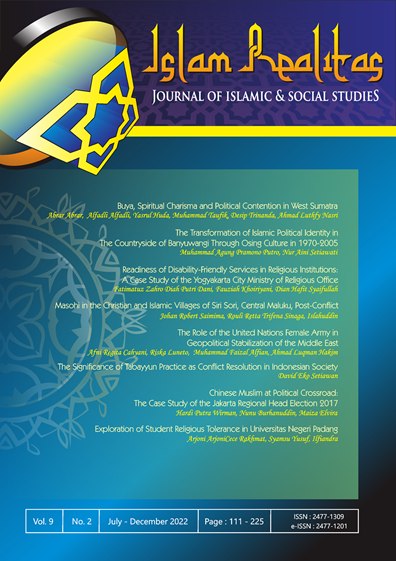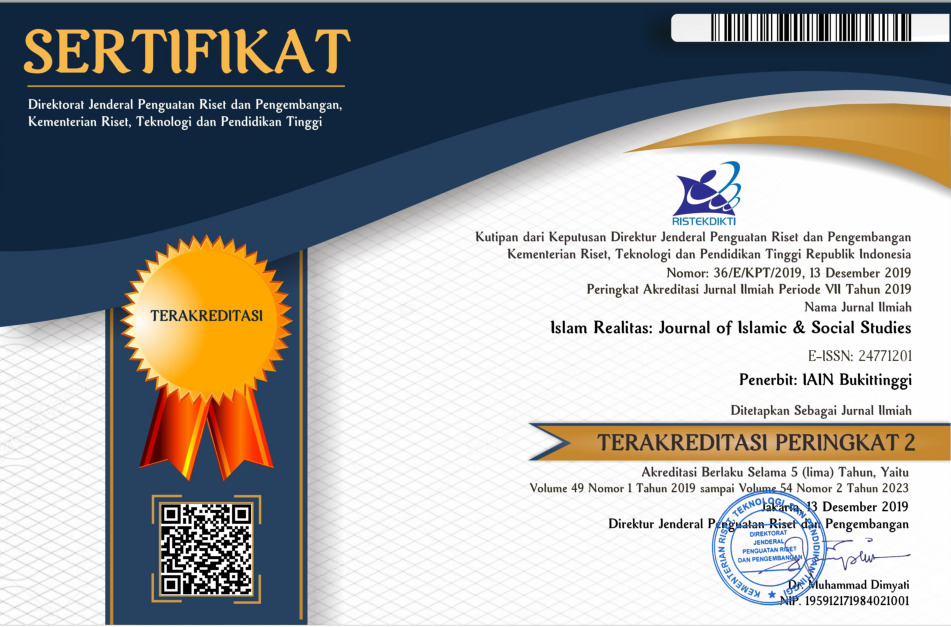Masohi in the Christian and Islamic Villages of Siri Sori, Central Maluku, Post-Conflict
DOI:
https://doi.org/10.30983/islam_realitas.v8i2.6011Keywords:
Masohi, History of culture, CooperationAbstract
This article aims to explain the role of masohi in maintaining relations between the Christian and Muslim communities in the Christian and Islamic villages of Siri Sori, Central Maluku, that witnessed the communal religious conflict in the period of 1999-2004. Post-conflict social relation has the potential for establishing harmony, which is particularly important given the conflict’s tragic impact and complex social implications. This can be achieved through masohi, which embodies local wisdom. Masohi can contribute to peace and conflict resolution between the two communities. The research question in this study is whether masohi can adequately serve as a solution in that context. This research uses a qualitative approach using observation, literature study, and interviews with Christian and Muslim figures from the two communities who have practiced masohi in the Christian and Islamic villages of Siri Sori. All the data about masohi is collected, sorted, analyzed, and reconstructed using culturally-based historical awareness perspective. The results of this study show that: (1) masohi manifests in interfaith cooperation between the two communities in their history culture; (2) masohi has a constructive humanitarian characteristic; and (3) masohi can be preserved to ensure the welfare of the people and to preserve peace sustainably.
References
Books
Amaliah, Tri Handayani. 2015. Konsep Harga Jual Papalele: Refleksi Budaya Maluku. Gorontalo: Ideas Publishing. https://opac.perpusnas.go.id/DetailOpac.aspx?id=992985.
Andalas, P. Mutiara. 2008. Kesucian Politik: Agama Dan Politik Di Tengah Krisis Kemanusiaan. Jakarta: Penerbit Libri, BPK Gunung Mulia.
Arsal, Thriwaty, Dewi Liesnoor Setyowati, Puji Hardat, & Hamdan Tri Atmaja. n.d. “Penanganan Konflik Melalui Budaya Lokal.†In Book Chapter Konservasi Alam Jilid 1, Jilid 1, 47–69. https://bookchapter.unnes.ac.id/index.php/ka/article/view/85/81.
Banawi, et. al., Anasufi. 2009. Masohi Dalam Upacara Buka Sasi Lompa Di Haruku-Maluku Tengah Dalam Etnopedagogik: Kajian Nilai-Nilai Etnokultur Sebagai Landasan Pendidikan. Edited by Rif’at Shafwatul Anam Supriatna, H. Mamat, Yena Sumayana. Bandung: Salam Insan Mulia.
Bartels, Dieter. 2017. Di Bawah Naungan Gunung Nunusaku: Muslim-Kristen Hidup Berdampingan Di Maluku Tengah (Jilid I: Kebudayaan). Jakarta: KPG.
Malik, Ichsan. 2017. Resolusi Konflik: Jembatan Perdamaian. Jakarta: Kompas.
Hudayana, Bambang. 2017. Pemberdayaan Masyarakat: Bunga Rampai Antropologi Terapan. Yogyakarta: Pustaka Pelajar.
Duncan, Christopher R. 2013. Violence and Vengeance: Religious Conflict and Its Aftermath in Eastern Indonesia. Ithaca & London: Cornell University Press.
Ropi, Ismatu. 2017. Religion and Regulation in Indonesia. Singapore: Palgrave Macmillan.
Saimima, Johan Robert. 2021. Kesadaran Historis: Eksplanasi Sejarah Sebagai Perekat Persaudaraan Masyarakat Siri Sori Islam Dan Kristen. Yogyakarta: Grafika.
Cooley, Frank L. 1962. “A Church Reformed and Reforming.†International Review of Mission 51.201: 26–32.
Watloly, et. al., Aholiab. 2016. Perdamaian Berbasis Adat Orang Basudara. Yogyakarta: Kanisius.
Watloly, Aholiab. 2013. Cermin Eksistensi Masyarakat Kepulauan Dalam Pembangunan Bangsa: Perspektif Indigenous Orang Maluku. Jakarta: Intimedia Cipta Nusantara
Hoevell, W. R. Van. 2014. Sejarah Kepulauan Maluku: Kisah Kedatangan Orang Eropa Hingga Monopoli Perdagangan Rempah. Yogyakarta: Ombak.
Journals
Astri, Herlina. 2011. “Penyelesaian Konflik Sosial Melalui Penguatan Kearifan Lokal.†Asiparasi 2.2: 151–62. https://jurnal.dpr.go.id/index.php/aspirasi/article/view/439.
Biver, Emile. 2014. “Religious Nationalism: Myanmar and the Role of Buddhism in Anti-Muslim Narratives: An Analysis of Myanmar’s Ethnic Conflicts through the Lens of Buddhist Nationalism.†unpublished Thesis of Master of Science in Global Studies Departement of Political Science, Land University.
Dhharmawan, Arya Hadi. 2006. “Konflik Sosial Dan Resolusi Konflik: Analisis Sosio-Budaya (Dengan Fokus Perhatian Kalimantan Barat).†In Makalah: Seminar PERAGI. https://d1wqtxts1xzle7.cloudfront.net/31194465/Konflik-Sosial-dan-Resolusi-Konflik-Analisis-Sosio-Budaya-Dengan-Fokus-Perhatian-Kalimantan-Barat.
Harmadi, Mariani. 2019. “Metafora Meja Makan Sebagai Upaya Membangun Toleransi Di Tengah Kehidupan Masyarakat Indonesia Yang Majemuk.†Dunamis: Jurnal Teologi Dan Pendidikan Kristiani 4.1: 99–111. https://sttintheos.ac.id/e-journal/index.php/dunamis/article/view/193.
IndonesiaKaya.com. 2022. “Makna Masohi Di Dalam Membangun Sebuah Kota.†https://indonesiakaya.com/pustaka-indonesia/makna-masohi-di-dalam-membangun-sebuah-kota.
Indrawan, Jerry. 2020. “Kearifan Lokal Suku Sasak Dan Suku Bali Di Lombok Sebagai Upaya Rekonsiliasi Konflik (Using Sasak Tribe and Balinese Tribe Local in Lombok as an Effort to Reconcile Conflict).†Verity: Jurnal Ilmiah Hubungan Internasional 12.23: 49–61. https://garuda.kemdikbud.go.id/documents/detail/1719482.
Ismail, Nawari. 2022. “Konflik Umat Beragama Dan Budaya Lokal.†https://adoc.pub/konflik-umat-beragama-dan-budaya-lokal-oleh-dr-nawari-ismail.html.
Jati, Wasisto Raharjo. 2013. “Kearifan Lokal Sebagai Resolusi Konflik Keagamaan.†Walosongo 21.2. https://www.academia.edu/4334687/Kearifan_Lokal_sebagai_Resolusi_Konflik_Keagamaan?from=cover_page.
Kasim, Fajri M., & Abidin Nurdin. 2016. “Resolusi Konflik Berbasis Kearifan Lokal Di Aceh: Studi Tentang Eksistensi Dan Peran Lembaga Adat Dalam Membangun Perdamaian Di Kota Lhokseumawe.†Ilmu Ushuluddin 3.1: 101–18. https://garuda.kemdikbud.go.id/documents/detail/1514492.
Nasa, Rikardus & Gisela Nuwa. 2022. “Resolusi Konflik Berbasis Kearifan Lokal Dalam Kehidupan Etnis Sikka Krowe.†Edukatif: Jurnal Ilmu Pendidikan 4.1: 1–6. https://edukatif.org/index.php/edukatif/article/view/1720/pdf.
Ode, Samsul. 2015. “Budaya Lokal Sebagai Media Resolusi Konflik Dan Pengendalian Konflik Di Provinsi Maluku (Kajian, Tantangan, Dan Revitalisasi Budaya Pela).†Politika 6.2: 93–100. https://ejournal.undip.ac.id/index.php/politika/article/view/10715.
Perdana, Dian Adi & Budi Nurhamidin. 2021. “Strategy Management in Overcoming Religion Conflicts in Plural Communities in Mopuya Selatan Village, Bolaang Mongondow District.†Islam Realitas: Journal of Islamic and Social Studies 7.2: 210–24. https://ejournal.iainbukittinggi.ac.id/index.php/Islam_realitas/article/view/4828.
Prasojo, Zaenuddin Hudi, & Mustaqim Pabbajah. 2020. “Akomodasi Kultural Dalam Resolusi Konflik Bernuansa Agama Di Indonesia.†Jurnal Aqlam: Journal of Islam and Plurality 5.1: 1–28. https://journal.iain-manado.ac.id/index.php/AJIP/article/view/1131.
Ruhulessin, John Chr. 2005. Etika Publik: Menggali Dari Tradisi Pela Di Maluku. Salatiga: Satya Wacana University Press.
Ruslan, Idrus. 2018. “Dimensi Kearifan Lokal Masyarakat Lampung Sebagai Media Resolusi Konflik.†KALAM 12.1: 105–26. http://103.88.229.8/index.php/KALAM/article/view/2347.
Saifullah, Muhammad. 2007. Mengelola Konflik Membangun Damai: Teori, Strategi, Dan Implementasi Resolusi Konflik. Edited by M. Mukhsin Jamil. Semarang: Walisongo Mediation Center.
Saimima, Johan Robert. 2016. “Fenomenologi Agama: Pendekatan Fenomenologi Untuk Memahami Agama.†Jurnal HERMES Komisariat Teologi Universitas Kristen Indonesia Maluku 1: 21–41.
Saimima, Johan Robert, Rouli Retta Trifena Sinaga, & Resa Dandirwalu. 2020. “The Relation of Orang Basudara to Unite Muslims and Christians of Siri Sori in Saparua Island, Maluku.†Multicultural Education 6.1: 166–70. http://ijdri.com/me/wp-content/uploads/2020/03/20.pdf.
Setiawan, David Eko. 2021. “The Significance of Tabayyun Practice as Conflict Resolution in Indonesia Society.†Islam Realitas: Journal of Islamic and Social Studies 7.2: 181–93. https://ejournal.iainbukittinggi.ac.id/index.php/Islam_realitas/article/view/4654
Sinaga, Rouli Retta Trifena. 2018. “The Importance of the Protestant Church of Moluccas (GPM)’s Pastoral Care for the Christian and Moslem Trauma Survivors at the Post-Communal Conflict in Moluccas.†In Advances in Social Science, Education and Humanities Research (ASSEHR) 187, International Conference on Religion and Public Civilization (ICRPC 2018), 58–64. Amsterdam: Atlantis Press. https://www.atlantis-press.com/proceedings/icrpc-18/55912134.
Soulisa, M. Syafin. 2020. “Budaya Orang Basudara Dalam Perspektif Al-Quran.†Jurnal Studi Islam 9.1: 1–27. https://jurnal.iainambon.ac.id/index.php/JSI/article/view/2049.
Sriwigati, et. al., Endang. 2004. Masohi Ambon: Ambon Sebagai Sentra Kepulauan Maluku. Jakarta: Kementerian Kebudayaan dan Pariwisata, Deputi Bidang Pelestarian dan Pengembangan Kebudayaan, Asdep Urusan Hubungan Antar Budaya. https://repositori.kemdikbud.go.id/10694/
Steenbrink, Karel. 2001. “Interpretations of Christian-Muslim Violence in the Moluccas.†Studies in Interreligious Dialogue 11.1: 64–91.
Suherman, Ansar, & Arief Sirajuddin. 2018. “Kearifan Lokal Sebagai Basis Komunikasi Pemerintah Dalam Penyelesaian Konflik Sosial Dan Komunal.†Dialektika 3.2: 34–42. http://www.ejournal.uniramalang.ac.id/index.php/dialektika/article/view/152.
Suprapto. 2013. “Revitalisasi Nilai-Nilai Kearifan Lokal Bagi Upaya Resolusi Konflik.†Walisongo 21.1: 19–38. https://journal.walisongo.ac.id/index.php/walisongo/article/view/235/216.
Wijaya, Nanang. 2020. “Resolusi Konflik Berbasis Budaya Oleh Masyarakat Kabupaten Poso.†Jurnal Kolaborasi Resolusi Konflik 2.1: 58–63. https://jurnal.unpad.ac.id/jkrk/article/viewFile/27048/13196.
Zarkasih, Nelly Yusro, Rian Vebrianto, & Musa Thahir. 2022. “Identifying Radicalism Potential in Senior High School Students in Riau Province.†Islam Realitas: Journal of Islamic and Social Studies 8.1: 98–110. https://ejournal.iainbukittinggi.ac.id/index.php/Islam_realitas/article/view/5286.
Interviews
Liklikwatil, Wilhelmina J., (Masohi’s History of Culture, Characteristic of Masohi, and Preservation of Masohi) Interview, {Wednesday, December 28, 2022}
Tutuhatunewa, Alex Robert, (Masohi’s History of Culture, Characteristic of Masohi, and Preservation of Masohi) Interview, {Wednesday, December 28, 2022}
Saimima, Jacomina, (Masohi’s History of Culture, Characteristic of Masohi, and Preservation of Masohi) Interview, {Wednesday, December 28, 2022}
Saimima, Maryam, (Masohi’s History of Culture, Characteristic of Masohi, and Preservation of Masohi) Interview, {Wednesday, December 28, 2022}
Saimima, Umi, (Masohi’s History of Culture, Characteristic of Masohi, and Preservation of Masohi) Interview, {Wednesday, December 28, 2022}
Downloads
Published
How to Cite
Issue
Section
Citation Check
License
Copyright (c) 2022 Johan Robert Saimima, Rouli Retta Trifena Sinaga,slahuddin

This work is licensed under a Creative Commons Attribution-ShareAlike 4.0 International License.
Authors who publish with this journal agree to the following terms:
- Authors retain copyright and grant the journal right of first publication with the work simultaneously licensed under a Creative Commons Attribution License that allows others to share the work with an acknowledgment of the work's authorship and initial publication in this journal.
- Authors are able to enter into separate, additional contractual arrangements for the non-exclusive distribution of the journal's published version of the work (e.g., post it to an institutional repository or publish it in a book), with an acknowledgment of its initial publication in this journal.
- Authors are permitted and encouraged to post their work online (e.g., in institutional repositories or on their website) prior to and during the submission process, as it can lead to productive exchanges, as well as earlier and greater citation of published work (See The Effect of Open Access).




